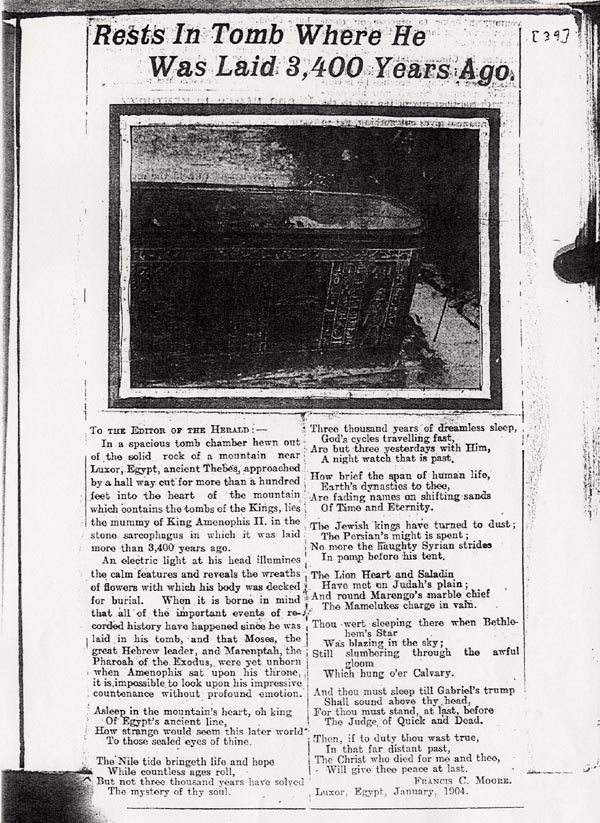
Rests in Tomb Where He Was Laid 3,400 Years Ago.
TO THE EDITOR OF THE HERALD:--
In a spacious tomb chamber hewn out
of the solid rock of a mountain near
Luxor, Egypt, ancient Thebes, approached
by a hall way cut for more than a hundred
feet into the heart of the mountain
which contains the tombs of the Kings, lies
the mummy of King Amenophis II. in the
stone sarcophagus in which it was laid
more than 3,400 years ago.
An electric light at his head illumines
the calm features and reveals the wreaths
of flowers with which his body was decked
for burial. When it is borne in mind
that all of the important events of re-
corded history have happened since he was
laid in his tomb, and that Moses, the
great Hebrew leader, and Marenptah, the
Pharoah of the Exodus, were yet unborn
when Amenophis sat upon his throne
it is impossible to look upon his impressive
countenance without profound emotion.
Asleep in the mountain's heart, oh king
Of Egypt's ancient line,
How strange would seem this later world
To those sealead eyes of thine.
The Nile tide bringeth life and hope
While countless ages roll,
But not three thousand years have solved
The mystery of thy soul.
Three thousand years of dreamless sleep,
God's cycles travelling fast,
Are but three yesterdays with Him,
A night watch that is past.
How brief the span of human life,
Earth's dynasties to thee,
Are fading names on shifting sands
Of Time and Eternity.
The Jewish kings have turned to dust;
The Persian's might is spent;
No more the naughty Syrian strides
In pomp before his tent.
The Lion Heart and Saladin
Have met on Judah's plain;
And round Marengo's marble chief
The Mamelukes charge in vain.
Thou wert sleeping there when Bethlehem's Star
Was blazing in the sky;
Still slumbering through the awful gloom
Which hung o'er Calvary.
And thou must sleep till Gabriel's trump
Shall sound above thy head,
For thou must stand, at last, before
The Judge of Quick and Dead.
Then, if to duty thou wast true,
In that far distant past,
The Christ who died for me and thee,
Will give thee peace at last.
FRANCIS C. MOORE.
Luxor, Egypt, January, 1904.
----------------------------------------------------------------------------------------------------------------------------------------------------------------------------------------------



